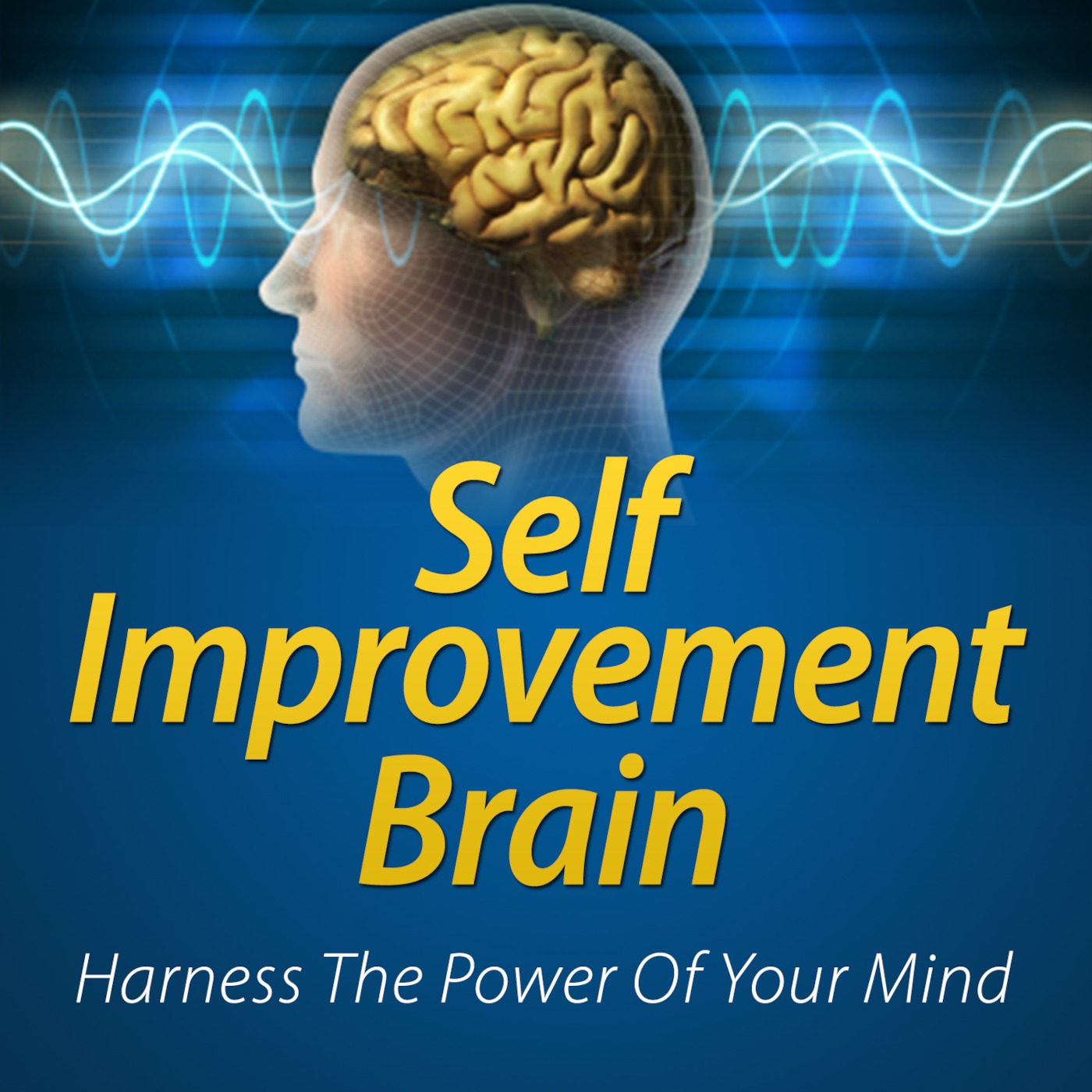Discover Self Improvement Brain's Podcast
Self Improvement Brain's Podcast

Self Improvement Brain's Podcast
Author: SelfImprovementBrain.com
Subscribed: 166Played: 12,323Subscribe
Share
Description
Learn How To Pick Up Vital Skills For Self-Improvement So You Can Work Smarter, Not Harder! You Truly Deserve The Best!
Self Improvement is the most important life skill for correcting your mistakes, and it’s one of the most challenging and rewarding abilities that anyone can learn.
So, How Can You Do This?
However, rather than having to go through life making the same mistakes and going through the same traumas, you can make a significant change to your future with the help of our website at SelfImprovementBrain.com. Check it out for more self improvement ideas and tips!
Self Improvement is the most important life skill for correcting your mistakes, and it’s one of the most challenging and rewarding abilities that anyone can learn.
So, How Can You Do This?
However, rather than having to go through life making the same mistakes and going through the same traumas, you can make a significant change to your future with the help of our website at SelfImprovementBrain.com. Check it out for more self improvement ideas and tips!
15 Episodes
Reverse
Imagine this situation: you have a test in two days that you should be studying for. Problem is, the weather outside is perfect, you cannot focus on your work, and if that were not enough, you just do not feel like studying right now. After all, you have two days to prepare for the test.
How hard can it be? Almost everyone has been in this situation at some point in their lives. While some actually work better at the last minute, it is not a habit that you should practice. Like all things, procrastination in moderation is a way for the brain to re-energize and refocus. Too much procrastination, though, and you could find yourself over-worked, over-stressed and quickly burnt out.
How can you finish your work on time and still enjoy yourself in the process? The following are a few tips that should help you to get off the road to perpetual procrastination and help you get back on the road to effective productivity.
Step 1: Make a schedule for yourself of what is due and when it is due.
If you have a gage of when everything is due, you will be less likely to put it off until the last minute. Additionally, the presence of due dates on a calendar will serve as a reminder to you, as well as an organizational tool. By breaking down your responsibilities and their deadlines into terms of what and when is due, you will be less stressed when you finally do begin to do the work.
When you are less stressed, you generally tend to be happier and more relaxed. Despite what you may believe, the relaxation experienced when you are procrastinating is a false one. Many people, despite the fact that they appear to be worry-free are, in fact, subconsciously concerned about the very things that they are putting off.
Step 2: Prioritize.
Separate your work into piles of “urgent” and “can wait.” No one likes to find themselves surrounded by excessive amounts of work and bills; however, by putting the most important ones first, you can eliminate some of the stress involved. Your “important” work should include items that are due soon and large projects that will time-consuming.
On the other hand, your pile should include items that are not conducive to you that do not need to be addressed immediately, such as writing letters to friends, finishing the latest pop culture magazine, or re-organizing your CD collection, all of which further contribute to your procrastination.
The use of Post-It notes or other organizational supplies are heavily recommended, as they provide a more vibrant and therefore more forceful reminder of what needs to be done and when it should be done.
Step 3: Focus.
All of the organizational materials in the world will not help you if you aren't willing to help yourself. Sit down, choose one task to focus on at a time, and begin working on it until you are finished, then move on to the next task. Before you know it, your work will be completed, and you will actually be able to feel relatively stress - free without the looming worry of work owed.
When you were in pre-school, you felt like you were the unluckiest person on earth, for you were burdened with the task of learning alphabets and numbers which seemed to be an almost impossible thing to do!
A few months hence, you proudly wrote your name on paper and boasted of your little achievement! Your parents watched you in awe and were so thrilled that their little child has learnt to read and write! Transformation of a small dream into reality.
A new born baby does not know the laws of the society. It is ruled by the ‘id’ which are basic instincts that we are all born with. As we grow up, we learn to live with certain constraints and be a part of the society. We learn that certain things are ‘possible’ and certain things are ‘impossible’. But from where exactly has this concept of impossibility crept into our minds? How do you know that a particular task is ‘impossible’ to achieve?
Our ‘ego’ is meant to protect us from prospective dangers. Based on past experiences, the ego makes judgments. However, one should not let ego control him/her. Instead, from the moment one starts taking control of the ego, all the so called ‘impossible’ things will suddenly seem ‘possible’, almost instantaneously!
We have preconceived notions about various things and we assume that it is ‘reality’. Eg: When you touch a hot stove by mistake, you take your hands off almost immediately by reflex action. So the ‘ego’ has learnt that fire is dangerous. Now if someone asks you to voluntarily touch a hot stove, you will not, because, your ego warns you against consequences. On the other side, have we ever wondered how certain people have been able to walk on fire?! They have proved that fire-walk is NOT impossible. These are the people who take control of their ego. This is the first step to achieve any dream that you think is impossible.
What we see is only our perception. To a large extent, our perception is influenced by our level of awareness. Sometimes, we find some problems difficult to solve. The same problem will look a lot easier when you look at it a little later. This happens because we grow constantly and we should work towards gaining more knowledge and increasing our level of awareness. Those who achieve the impossible have an everlasting thirst for knowledge. The more you gain of it, the concept of ‘impossibility’ will vanish from your mind.
There are only three key focus points to achieving impossible dreams: Clarity, Commitment and Focus. Be clear of what your “impossible dream” is. Have the burning desire in you to convert it into reality. Channelize all efforts towards achieving the dream with a single and focused mind.
Visualize yourself and your state of mind when after having achieved the goal. How would you feel? Wonderful, right?! You feel are in a state of renewed confidence and self-worth. Keep these fruits in mind, and work towards it. Draw a road map to achieve the goal. Put down the goals in writing and stick it on your wall/pinboard such that you are reminded of it everyday. Establish timelines, review your progress periodically and take alternative courses of action when necessary.
Do you ever stop to think how hard your brain works for you every Day? Most of us do not consider the importance of our brain while we focus on the rest of our body.
Your brain is the most essential organ and yet it is the organ least cared for. You need not study hard or become a bookworm to boost your mental faculties. Just a few smart tricks, techniques, habits, changes in diet, lifestyle and behavior could energize your grey matter and get the best results from your brain.
Here are a few tips to tend proper care for your brain:
Physical exercise strengthens your brain, too. Exercise benefits your brain cells. The blood vessels inside your brain dilate and increase blood flow when you engage in regular exercise. Exercise helps to excrete toxins and allows oxygen and other nutrients to flow into your brain strengthening your brain cells.
Start your day with a healthy breakfast. Skipping breakfast affects your brainpower and performance at home, school or work.
Kick-start your brain in the morning so that it wakes up and is all ready when you start your morning. Why don’t you start off your day with a crossword puzzle or sudoku from your morning newspaper? Your brain needs these teasers to be more efficient during the fist few lazy hours in the mornings.
Research backs up the support in favor of omega-3 fatty acids. Fish is the best brain food. Omega 3 fish oil is not just healthy brain food for babies. It's also an essential brain food for children, adolescents and adults. The EPA and DHA in fish oil seems prevent dementia.
Here is a trick to remember something important for the next day – read and review over the matter needed for the next day before you go to sleep the previous night. While you sleep your brain does its sorting and filing for you and stores it for you. When you think about it the next day your brain supplies this information fresh out of its memory cells.
Did you ever get stuck with a small detail when your brain just stops and you experience a mental block? Try darting your eyes from side to side. You would be amazed at the results! What is the reason behind this? Everyone has a left and right hemisphere in the brain. They communicate constantly on a daily basis throughout your thinking process. Sometimes when this communication link or connection gets weaker for some reason you may experience a memory lapse. Darting your eyes helps to strengthen this connection to jerk your memory and bring back into focus that little detail you had forgotten all along. All it takes is 5 to 10 seconds to jolt your brain. Try it.
Good sleep, music, busy life and plenty of water are also factors that help in building your brainpower.
It is possible to boost your brainpower at any age. Try these strategies and you would start praising your brainpower in as little as two weeks!
You probably have decided to change your attitude towards the effective use of your time. Still, you are short of accomplishing your tasks. You begin to wonder whether you have made the right decision or not.
Do not lose hope and opt to go back to your old habits. You are making the correct decision. Overcoming the oppressive procrastination habit begins with a resolute choice to change. The road ahead is laden with stumbling blocks that will be extremely trying especially for someone who is used to taking the easy way out.
Acknowledge the fact that it is not going to be a smooth ride to success. Knowing what you are dealing with can spell all the difference.
Here are some helpful tips to achieve your goals through an effective time management:
Plan. It is your best defense against reverting to your old habits. Be specific about what you need to accomplish for a particular period. Write them all down and classify them according to the level of priority. You need to accomplish first the tasks which bear the highest priority. This way, you are able to spend much of your strength and energy on the most arduous tasks when you still have them. Later you will discover that the most difficult part is done and it becomes extremely easy for you to finish the rest of it.
Practice. You need to continually develop the habit of knowing the difference between effective time management and dawdling. Planning is the easier part of the whole process. It is very effortless to jot down goals and objectives but to actually accomplish them is the test of genuine desire to change. Be wary of potential disruptions. You have to be clever enough to spot even the most minute schedule interruptions. Shake them off at once and get on with the program. It is only through good practice that you can master the art of time management. The rule is not to be impenetrable, that is too impractical. Rather, you need to know the means to effectively put into practice what you have set to do whether you will achieve it or not.
Pat. Reward yourself whenever you have successfully accomplished any set goal. Do not be too hard on yourself. The point is to adapt a better understanding on the proper use of time. If you do achieve some of your goals, do give yourself a pat on the back. The fact that you have done well is already a reward in itself but you can go beyond that and indulge once in a while.
Life is short to be wasted on worthless activities. Take charge of your life by taking control of your time.
Professional growth is essential for everyone.
Your quality and status of life depends on you position in your profession and financial income. Your professional growth plan would lead you to the position and income you desire so as to fulfill the dreams of your life.
Your professional growth development depends upon these factors: Your ambition, your drive, your abilities and your interests.
You should have a clear-cut idea about these factors so that your path towards your future becomes clearer to you. Your professional growth plans need not be complicated but you could write down simple but detailed plans so that you could eventually achieve them in time.
Here are a few tips to map out your professional growth plan:
Take responsibility and be in charge of your professional growth - Do not rely on others to map out your career plans. If you have a mentor or a manager to support do not hesitate to take advantage of it. But otherwise you would be better off scheduling and planning your own growth in order to reach the top.
Write a list of different ways you want to grow - If you would like to stay on with the current employer and plan to grow with the company you could look for skills you need to beef up. Check you performance reviews, feedback from management and peers, any appreciation letters, awards, etc. These are some inputs that could reveal your strengths and weakness. Whether you plan to change careers or go up the ladder in the same career find someone who has tread-ed the path before you and ask them for advice. Focus on one or two areas on improving at one time. Learn to grow slowly and steadily so that you could win the race.
Explore your options open before you, to learn and grow - Research your scope and options open before you. Check around the various educational opportunities, training opportunities, etc. that would help you to grow personally and professionally. Time management, leadership development and team building skills, etc. are essential for corporate promotions. Your social skills also develop along these lines.
Identify suitable options that fit your needs and learning style - Each one of us is unique. We all learn in different ways at different pace. Once you explore the learning options before you, consider the methods that best suit you –
Do you like interacting with others? Do you prefer to listen to classroom lectures? Are you a self-learner who learns by reading books? Are you a self-motivator? Do you have time needed to attend regular classes? How much could you spend on these programs? Does your company support your interests by paying for them? These are important points to explore.
Do not procrastinate and get started - The biggest and the most common barrier to development is procrastination. We all plan and talk about our plans. But only a few stick to their plans and start off at the planned time in a planned manner. What good is it if you just plan and do not take steps to execute your plans?
If you do not start, you would never succeed in your professional growth development. So start now.
Everybody wants success in life.
A certain level of personal development, personal growth and self-improvement helps you to attain goals and achieve success in your life. These factors enrich your relationships, career prospects, professional success and life in general.
Personal development, personal growth and self-improvement techniques are inter-related and help you to improve your personal and professional management techniques.
Here are some of the important skills that help you to succeed in life:
Effective communication - Communication is the key to accomplish your goals in personal and professional life. You should be able to express your ideas clearly and effectively so that others understand exactly what you want and what you are trying to convey to them. Your communication skill should include the following to be an effective one – a good vocabulary, a proper tone, proper voice modulation and the right approach. You should also develop writing skills using the same factors mentioned above. It is good to develop these - your language, speaking and writing skills, sharp listening skills and proper telephone communication.
Self–confidence - Self-confidence means believing in oneself. A small boost in self-confidence allows you to take long strides towards achieving your goals in life. A lack of self-confidence hinders personal growth. If you are one with low esteem and low self-confidence you should take steps to build your self-confidence before it is too late. People who lack self-confidence tend to have self-doubt, fear, inferiority complex, etc. If you want to be successful in life you need to overcome all these negative traits.
Stress management - Stress challenges everyone in life. If you buckle down under stress you would not be able to achieve anything in life. If you let stress overrule you completing even simplest tasks would pose a great challenge. There are many stress relieving techniques you could learn to overcome stress and meet life’s challenges in order to meet your goals.
Positive attitude - A negative attitude stands as a stumbling block in anything and everything you do in life. It zaps the much-needed energy associated with attaining your goals. Positive attitude on the other hand keeps your creative ideas flowing and makes you feel energetic to move forward towards your goals.
If you are seriously seeking improvement in these areas there are plenty of avenues to consider. Seminars and self-improvement publications, library, online resources, CDs etc. are all rich resources that help many people on their journey through personal development, personal growth and self-improvement.
Develop these 4 qualities and see a sea of change in your life. These are the most important traits that could help you achieve success in all the spheres of your life.
I have just one question for you,
"What Self Improvement Question
Are You Struggling With Today?"
Please let me know in the comments section below so I can
provide answers for you, that way you can help others as well!
Please share this podcast with those you care about!
Thanks, Don Weyant. SelfImprovementBrain.com
What is life without challenges and problems?
Everyone faces challenges in life, regardless of age, gender, economic status, etc. Right from a young age up to a ripe old age everyone faces challenge almost everyday in life. The bigger your life’s goal, the greater is your challenge. Facing and overcoming problems require some amount of maturity, understanding and some strategy.
Here are four tips to face your challenges in life:
1) Learn to forget the problem and focus only on solutions – Well, forgetting the problem does not certainly make it disappear! But if you temporarily take your mind off the problem you would save yourself from unwanted anxiety. Unwanted stress would only lead to wasting your energy. You could instead spend that energy on looking for ways to solve the problem.
Majority of us just freeze when we are faced with challenging situations. Instead, if we could immediately look for solutions the problem may clear easily. This is not easy but with some self-awareness and positive attitude you would learn to find your way through problems. When you are challenged with a problem the next time, first set aside your emotions, understand the problem and search for a solution right away.
2) Get help by reaching out to friends and family: Sometimes when you just let go of your ego and shame and ask for help you would be surprised at the way people receive you with love and concern. What are family and friends for? These days support groups are available online and in the community for almost every problem. You have support groups for addictions, seniors, single parents, parenting, marriage, education, health and religion… just about anything.
When you have a problem do not think you are all alone. When you get in touch with these support groups you would realize that you are not the only one being tested by life’s challenges. You would share each other’s experiences and shoulder each other’s problems through these support groups. You could search for support groups in the Internet or call an expert, look in the newspapers, magazines, talk to people, etc. Support groups give a lot of strength and courage to fight your challenges.
3) Act now! - ‘Now’ is the best time to take on your challenges. Many people think and think and think and talk about it all the while but they would not move an inch towards a solution. What good is that? When you see a challenge, take action immediately. You would waste precious time if you wait around or wait for someone else to start dealing with your issues.
Build self-confidence and resilience and start to fight your problems and you would have overcome your challenge before it settles down on you! The faster you act, the speedier the problem gets solved.
4) Practice patience and Perseverance - Nobody is a born professional at solving problems. Each time a problem challenges you it is a new experience. You could act wise by learning to be patient and persistent and practice perseverance in order to study your pattern of problems. This is a good way to draw your strategies and act accordingly. Soon you would be a master at dealing with your challenges.
I have just one question for you,
"What Self Improvement Question
Are You Struggling With Today?"
Please let me know in the comments section below so I can
provide answers for you, that way you can help others as well!
Please share this podcast with those you care about!
Thanks, Don Weyant. SelfImprovementBrain.com
Do you believe that your belief system is what makes things work for you or against you?
With your belief system you could create a life with your own values and desires which could ultimately shape your future. If your life has not been successful then you should probably change your earlier beliefs so that the new ones work for you and not against you.
Here are some useful tips to change your belief system into one that could work for you.
Let go of fear - do not allow past experience of pain and fear guide you about what you need to do. Fear is an obstacle to growth. Fear freezes your mental ability to think positively. You should learn to empower yourself with positive attitude and get rid of fear. Stare fear in its face and just see what you are afraid of. When you analyze the causes and reasons for your fear you would realize that most of it is just created by yourself. If you have fear in your mind, erase it right away. Face your life with boldness and look for ways to reach for your goals.
Develop optimism– optimists are self-disciplined and persistent in what they want to achieve in their life. Optimists plan and take action to move forward. They constantly learn about how to get better at their skills. Their self-confidence helps them to look for solutions and lead them to success in their goals. If you are pessimistic it is time you shed your pessimistic attitude and develop optimism in its place.
See change as an opportunity for growth – change leads to growth. We all go through so many changes in life. We all learn to grow through these changes. If a particular belief is making you stagnate or blocks your progress in life, just change it and follow a new belief system that would enhance your growth and development in life. Get rid of your old belief and replace it with a new one.
Analyze your belief system – generally our beliefs are formed from our past experiences in life. We also adopt certain beliefs from our parents, culture, peer and environment. When you realize that your beliefs do not support you in your life, be brave and open yourself to build a new belief system. Life changes all the time and you could change your beliefs accordingly without feeling guilt or fear.
Adopt new beliefs, which you think would help you in your life. Write them down and practice them over and over consciously until they become a part of your daily routine
Educate yourself about your belief system. Learn to support your beliefs. Ask yourself why you believe in something, what made you change your old belief in its place, whether you are happy with your new beliefs, etc.
When you change your limiting beliefs and adopt new ones, you may see your course of life running smoothly.
I have just one question for you,
"What Self Improvement Question
Are You Struggling With Today?"
Please let me know in the comments section below so I can
provide answers for you, that way you can help others as well!
Please share this podcast with those you care about!
Thanks, Don Weyant. SelfImprovementBrain.com
People are worried all the time about every little thing in life. Come to think of it, is it really worth it?
If you could change things around you would. But if you could not, the best way is to accept it and move on with life.
Try to be cheerful and happy and soon you would realize that life is not that bad at all. But how could one be happy?
Here are some great tips that teach you to be happy. Read on but promise to pass it on to others.
Understand that simple things can make you happy - such as a bird’s song, cool air, sunshine, etc. could make you happy.
Mingle with happy people – mix with those who are merry and joyous. You could catch it on if you have an open mind and spread it around you.
Do not dwell in self-pity – wallowing in self-pity lowers your self-esteem and self-confidence. If you could take action be quick to correct troubling situations. If it is beyond you, you may just forget it and carry on your life with a happy outlook. Who knows what is in store for you in future? Be hopeful instead of drowning yourself in self-pity.
Love yourself – if you cannot love yourself it is difficult to love others.
Laugh at adversity – who does not have problems in life? When you laugh at your difficulties, you would realize they become insignificant and you feel lighter
Be healthy - good health is a great factor in making you happy.
Believe that you deserve happiness – believe that happiness is your birthright and you deserve to be happy. It is after all your choice and no body could take it away from you if you choose to stick on to it.
Engage in different kinds of activities than your usual routine – breaking the routine sometimes makes life interesting. Look into ways of changing your routing and you may enjoy it.
Choose to be happy – you have the ability to take positive or negative approach to your issues. If you choose a positive approach, happiness is easy to reach.
Develop a sense of gratitude - whenever you feel that you lack something in life remember all those things that you have in your life you could be thankful for such as a roof over your head, a decent family, your physical and personal strengths, etc. This should make you happy for what you have in your life.
Avoid negativism – fill yourself with positivism that would make you see life in new colors and shades. You would see life with new eyes and bubbling energy. That is happiness.
Learn to laugh at yourself – this is an excellent approach to life. Everyone makes mistakes. Your errors are only bad if you take them seriously. Just laugh at yourself if you err and your heart would lighten up.
Remember, it does not cost you a penny to be happy. Your life and your choice are at your hands. Isn’t that reason enough to be happy?
I have just one question for you,
"What Self Improvement Question
Are You Struggling With Today?"
Please let me know in the comments section below so I can
provide answers for you, that way you can help others as well!
Please share this podcast with those you care about!
Thanks, Don Weyant. SelfImprovementBrain.com
Success is not reserved only for a chosen few. Everyone has the capacity to be successful in every area of his or her life. Success results from cultivating certain habits and sticking to them.
Consistency is a must. Successful persons have a certain type of personality. Successful person thinks in a particular way, talks in a particular way and acts in a particular way.
Would you like to be a successful person too?
Here are a few principles of success that is bound to help you if you follow these strategies:
Develop a clear vision of what exactly you want to achieve in your life. Carry this vision in your mind at all times. This is the starting point to success.
Believe without any doubt that you would achieve your dreams. Believe in a higher power that has been giving you whatever you needed so far.
Stay away from negative influences such as negative people, books, articles, etc. Surround yourself with things that boost your belief that you would succeed.
Take responsibility for your future. Do not depend on anybody and take responsibility for your life without doubting success.
Make a habit of repeating positive affirmations. Speak out your affirmations in present tense as opposed to future tense. Writing down affirmations is more effective. This helps your mind to stay fixed and focused on your goal. This is also a good way to build your self-confidence and deepen your belief.
Make a firm commitment to action. Once you decide to take action stay committed and never give up. Once you deter from commitment your belief becomes shaky and unstable. If you do that then your efforts would just fall off like a deck of cards. You would have wasted all your time and energy you had invested on your efforts. So stay committed.
Set a specific goal. If you know what you really want to achieve you need to define it by making it a goal. Set specific goals. Your goals should be precise, measurable, realistic and timed.
Work out a plan of action. Break down your plan into smaller tasks or units. Do your task in smaller steps. Take one step or two each day while reminding yourself that each step is taking you closer to your goal. Your actions should be filled with faith, determination and purpose. Consistency is vital to reach your goal.
Never give up until you have achieved what you desire. Persistence is key to success. Treat every failure as a learning opportunity. But push yourself towards your goal with stronger faith.
Maintain an attitude of gratitude, realizing that your dream is becoming a reality. Look around you and be grateful for things that you already have such as a home, loving family, etc. Just stay grateful.
Be a giver - give your time, money and service to others. Be kind and generous to all.
Now you know the principles of success. Act on it with faith and persistence.
I have just one question for you,
"What Self Improvement Question
Are You Struggling With Today?"
Please let me know in the comments section below so I can
provide answers for you, that way you can help others as well!
Please share this podcast with those you care about!
Thanks, Don Weyant. SelfImprovementBrain.com
Success is a goal you undeniably want to strive for in life.
As with everyone else, you would like a piece of the good life. You would want to rise above your capacities and drive yourself to the best you can possibly reach.
In life, there are so many ways to get to your dreams.
You may want to consult Feng Shui experts. You may want to consult astrological charts. You may turn to God. You may turn to creative imagery to get what you want. However you would like to build your personal pillar of success, I believe that there are constants and absolutes. A good, solid foundation is a constant in building any sturdy edifice. Thus, it is essential that there be a strong foundation in the construction of your personal pillar of success.
Integrity, no matter what your religious beliefs are, is the bedrock of all transactions.
Why would you want to deal with things with integrity? Well, forming relationships is a must if you are in pursuit of success; and of course you would like to take good care of these relationships. Integrity builds trust, which is an essential relationship lubricant. One does not need studies to confirm that clients would go back to someone with whom they were able to deal with smoothly and stuck to his end of the deal.
The currency of life is “Quid Pro Quo”, or “give me as I would give you”.
So many business relationships have been severed because a party did not meet the end of the deal, or cheated the other of what was his due. As you sever more and more relationships through the lack of integrity, you will encourage the crumbling of your pillar of success.
It helps when you would go through life with a clear conscience and the knowledge that you have given your best to your client, or with whomever you have an interpersonal relationship. The lack of moral and emotional baggage frees you to be more productive, thus allowing you to build your pillar of success faster.
To cultivate integrity, start with the little things.
Tell the truth in the most trivial of situations. Catch yourself when you are about to tell a white lie. Be transparent in all your transactions. Give change to your customers to the very last cent. As an adage says, “If you are faithful in little, you will be faithful in much.” Such is true in cultivating everything, even integrity.
Quid Pro Quo. That is the currency of human relationships. Take care of your relationships. Fortify it with Integrity.
You can never go wrong with being very honest towards everyone.
I have just one question for you,
"What Self Improvement Question
Are You Struggling With Today?"
Please let me know in the comments section below so I can
provide answers for you, that way you can help others as well!
Please share this podcast with those you care about!
Thanks, Don Weyant. SelfImprovementBrain.com
We all face hardships at some point in our lives.
Some of us own responsibility and get on with our lives while most of us blame others. When you own responsibility for yourself you empower yourself. You are the cause and your life experiences are the results in your life. You determine the direction of your life. You are in control of your life.
If you are not able to explain why your life is as it is, you are probably giving your power away to someone else, are you?
Most of us tend to blame something else or someone else or our fate for all bad experiences in our life such as abusive childhood, loss of a loved one or broken relationships. When you are not in control of yourself or your life that means you are powerless. Blaming is a disempowering emotion.
If you think by blaming others for your life you are getting away from problems you are completely wrong.
Your life problems would stay the same and recur again and again as long as you make someone else responsible for your life. You give others power to control you and your life. So your life problems would tend to stay the way they are until you take back your power and claim full responsibility for your emotions, actions and life as a whole.
True empowerment is taking responsibility for your life so that you are free to do whatever you want to do and be anything you choose to be.
Here are 4 tips to empower you:
Make your own choices - Life is full of choices and you have the freedom to choose. You learn only through trial and error. Be bold and accept the outcome of your decisions. If your choice is correct, be happy. If not do not blame yourself or others. Instead, analyze where you went wrong and correct yourself. The next time around, you may be able to make the right choices.
Practice deep breathing - If you make it a habit to practice deep breathing throughout the day, you would have clarity in your thoughts. You feel more relaxed to think clearly and make good judgments of your situations.
Feel grateful - Gratitude is something we never show for many things we enjoy in our life. Instead of cursing your problems look around you and realize how blessed you are to have nature bestow you good health, sunshine, food, good relationships, fresh air, etc. When you feel grateful for these things you are convinced that life is not bad at all.
Develop mental awareness - Observe your thoughts. Are they good or bad? Are they positive or negative? If your thoughts are positive it is good. You could act on them with positive results. What if you have negative thoughts? You could still control them if you are aware of them. Empower yourself by being aware of your good and bad thoughts.
When you deal with your own pains and pleasures you are the controller of your life. Just know that no one else could take away your power to control your life and events because you are the master of your destiny.
I have just one question for you,
"What Self Improvement Question
Are You Struggling With Today?"
Please let me know in the comments section below so I can
provide answers for you, that way you can help others as well!
Please share this podcast with those you care about!
Thanks, Don Weyant. SelfImprovementBrain.com
“The eyes are windows to our soul” say an English proverb.
This world is full of people and your eyes tell them a lot about you. Your eyes tell a lot about your personality. It shows if you are aggressive, soft, inviting or loving. If you notice salesmen, politicians, teachers and public speakers you would realize how effectively they use their eyes to maintain their contact with you. Eye contact is vital to effective communication.
Eye contact is a major body language factor when it comes to communication. If your eye contact is too much, you are seen as an aggressive person. On the other hand if your eye contact is too little you are seen as disinterested in the person speaking to you.
How do you use eye contact in every day life and in different situations?
Eye contact when talking to an individual – It is important to maintain eye contact with an individual during a conversation. But it could be uncomfortable if you stare intensely at her. In order to avoid this uncomfortable situation, it is good to break eye contact every 4 to 5 seconds while talking to the other person. You may look up or sideways as though you are noticing your surroundings or the decorations around you, etc. Looking down indicates you have ended your conversation.
Eye contact while listening to the other person – It would be very rude and putting off for the speaker if you just stare too hard at him or her. You could look at that person and also look around his facial features or observe around the room etc. in order to stop staring at him. Again, it is best to shift your eye contact every 4 to 5 seconds to keep the interest in the conversation without staring at the talker. You could use your head to nod as an agreement or say ‘yes,’ ‘hmm,’ or any other expression to show that you are listening so that the other person knows that you are listening to him with interest. This keeps the conversation going in a smooth manner.
Eye contact during an argument - Gazing during an argument shows strength. If you are aggressive, you wish to prove your point or your power to the opponent you gaze at him. If you look away during an argument that could mean you are not sure of your own self or about what you are saying and you give up or have lost an argument.
Eye contact while expressive love – When you like the person who is talking to you, you tend to use her whole face as your focal point. You look at her eyes, listen intently to what she is saying with a smile, raise your eyebrows or dilate your pupils to show that you are enjoying the conversation.
Lovers sometimes do not say anything to each other but share a prolonged gaze at each other. But if you were to look away or yawn while the other person is talking you may be telling her that you are not interested in talking to her.
You could use your eyes effectively to keep your relationships in a good stand.
SelfImprovementBrain.com
You may have already gone through the process of creating a list of lifetime goals – the next step is to actually start the process of achieving them.
This involves creating a list of smaller goals that you plan to achieve over the next 25 years preparatory to reaching your lifetime goals.
After creating a 25-year plan, make a 5-year plan, then a 1-year plan, then a 6-month plan and then a 1-month plan. Get the picture? Each plan is founded and contributes to the lifetime plan.
The 3rd step is to make a To Do List that are tasks that you should do everyday. But be realistic: you might have to do your research first by reading material that will help make your daily goals more realistic. By doing these tasks, are you living a life that is worth living or do you just exist from day to day?
Stay motivated everyday by assessing your To Do List then examining your longer term plans to see if there is any need to make changes due to the experience and priorities that you have imbibed.
You may find the following general guidelines useful for this purpose:
Is each goal stated positively?
Is it precise? This allows you to measure achievement accurately.
Have you set priorities among the goals that you have listed down?
Did you write down your goals? You will be surprised how much more forceful the goals become.
Are the low-level goals small enough to achieve?
Can you control the outcome of your goals?
Are your goals realistically low?
Did you make your goals high enough to pose a challenge?
It is important to reward yourself somehow once you have accomplished a goal.
Absorb the feelings that come with goal achievement and rank your progress among all the plans that you made earlier. What is a good way to reward yourself? It depends – some people find it sufficient to treat themselves to a sweet treat. Others like bigger rewards. Just make sure the reward’s worth is proportionate to the magnitude of the task.
You will find that assessment of your goals is an ongoing process every time you achieve a goal.
If you found the goal to be much too easy to accomplish, maybe you should make the next set of goals more difficult. If the task took much too long to accomplish, maybe the goals should be a bit easier. Learning is an ongoing process as well so maybe you should change other goals too to reflect this. For example, perhaps your skills might need adjustment so this will, in turn, affect your goal setting and assessment.
Should you find it difficult to meet goals or outright fail, do not think that this completely derails your plans. So long as you learned from your performance, that is what counts.
Your maturity will be reflected in the changes you make in your goals.
Some goals can be let go if they are not suited anymore to your short term and long term plans. Do not be a slave to the goals you have set. Maintain a degree of flexibility.
SelfImprovementBrain.com
In this podcast, you will learn how to be the change for good in your own life. Learn how to rise above the old you to a new understanding of your potential. http://SelfImprovementBrain.com
“We must be the change we wish to see” – Mahatma Gandhi
Do you want to change your life? How do you describe your ideal life?
What are your dreams and aspirations?
Have you tried a lot before to change your circumstances and improve your life without any success?
What approach were you taking?
Here is the best way to embrace the change you want to see in your life:
Work on yourself. Become the person who deserves the position that you want to be in.
You want more money… Do you have the required wealthy and abundant mentality?
You want better relationships… Are you the person who people would enjoy being around?
You want a better job… Do you have the skills and qualifications required for your dream job?
You want better health… Are you thinking in terms of a healthy life style? Or do you just focus on diet?
You can’t be rich while you have negative thoughts and beliefs about money. Whatever you aim for, you must first be the change you wish to see.
You must tune yourself and be ready to receive the change you wish to see. Change starts from within. Live your life from the inside out.
You must be the change.
Feed your mind with positive thoughts. Develop every day. Work on yourself. Learn and grow. You are the key. Change to see the change! Success is a journey that needs a lot of patience along the way.
“We must be the change we wish to see” – Mahatma Gandhi
I have just one question for you,
"What Self Improvement Question
Are You Struggling With Today?"
Please let me know in the comments section below so I can
provide answers for you, that way you can help others as well!
Please share this podcast with those you care about!
Thanks, Don Weyant. SelfImprovementBrain.com



















